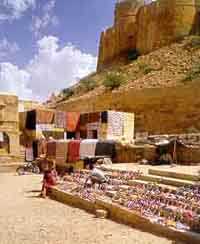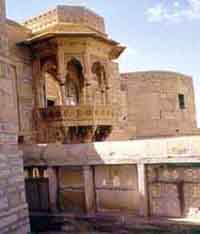|
Travelogues Jaisalmer: Golden Rendezvous
|
|||||||||||||||||||||
I'm justifiably apprehensive. A golden rule for a traveller is to travel light, and here I am, carrying excess baggage. Images from Satyajit Ray's 'Sonar Kella', fanciful visions evoked by Zakir Hussain's desert tunes, and Lata's 'kesariya balma'. Jaisalmer couldn't possibly live up to all that, could it?
We traverse endless barren land: in the midst of cacti, the occasional army jeep and peacocks. Entering Jaisalmer, we see scattered houses, and quite suddenly, the fort. Jutting out of the hillock it is golden, glittering, and beguilingly small. Juxtaposed against the fort, the ornate sandstone road dividers and bus stop are like pieces of imitation jewellery.
|
More on Rajasthan • An Overview
Travelogues
Impressions | ||||||||||||||||||||
The rest of the fort, we discover, is a quaint town. Atop the fort, stand two cannons, least intimidating. The view of the entire toy-like golden town is enchanting. Alongside, a woman is washing vessels. I ask for water, and she takes me home, two steps away. She asks if I like the place. It's beautiful, I tell her. Everybody says so, she says, smiling tolerantly at my stupefaction. At sunrise we ride our camels over the dunes, until the bus arrives. Along the way, it crunches to a halt near some houses. We hear a wailing, whining sound. Rhythmic, but painless. A bejewelled woman, shrouded in long orange veil, is shepherded in. We realize with a shock that it is her voice. "She's the bride, so she's crying. It's the custom here," we're told. She steps into the bus, and instantly, as if switched off, stops wailing. Crying, a custom?!
We spend the afternoon at the nearby Akal Fossil Park. The tree fossils lie in barbed wire enclosures. 180 million years old, they indicate the presence of water. We stand quiet; privileged to have taken a peek into what must have been the beginning of a mammoth odyssey. The surrounding rocks and stones are beautiful too, with strange patterns in a multitude of colours.
The camels for our safari are waiting patiently. I drag out my acquisition - a 'saafa' and ask for the turban to be tied. When it's done, I feel like a carefully wrapped, fragile piece of china. We stop at the Bada Bagh village. The sandstone cenotaphs are exquisitely carved. We ask Ali, our aged camel man, to sing. He sings a lilting Sindhi wedding song, learnt from his relatives across the border. It takes us time to recognize the next song - it's English! "We are going on a camel safari, we are making a campfire, having dinner". "Did you like that song, madam," he asks? Dare we say no? "We take many foreign people for a safari", he explains " we think they'll feel good if we sing in English, so people here made it up."
The Amar Sagar village is our next stop. "I'll show you around, ma'am, I can talk English", a young boy says. A summer palace stands abandoned. It is simple, elegant and in stark contrast to the town buildings, is made of white stone. A small 'shiva ' temple stands at the end of an unkempt garden. The maharajas used to swim in this pool, the kids tell us. It is now laden with moss. A long open balcony overlooks the lake. Light plays tricks on the remnants that are half buried in water. There is decay, neglect, and yet, it looks exactly like what it was - a retreat.
As we approach the town, Ali breaks into a Rajasthani song. The fort is silhouetted against the last rays of the sun. I realize that my baggage has been weightless. I cannot but agree with my travel book's lines on Jaisalmer - 'Nothing prepares you for it'.
|
|||||||||||||||||||||
Editor: Romola Butalia (c) India Travelogue. All rights reserved. |
|||||||||||||||||||||

 We walk on to the fort. Red, yellow, green, blue - clothes, quilt and puppet shops dot the stone path to the courtyard. Men are peddling the manjira - we walk to it's intoxicating tune. One building is now a museum. A beautiful Jain temple is tucked away.
We walk on to the fort. Red, yellow, green, blue - clothes, quilt and puppet shops dot the stone path to the courtyard. Men are peddling the manjira - we walk to it's intoxicating tune. One building is now a museum. A beautiful Jain temple is tucked away.
 We climb out into the soft sand a little before sunset. The sky is a chameleon - pink, lavender, gold. The curves of the dunes are like sea waves that have frozen for an instant, at sunset. In a sudden flurry, the cottage caretakers run to shut all windows and doors. Out of nowhere the winds begin. Echoes spring from the recesses of my mind- "Maaru mein chalti hai pagal hawaiye, maaru akele na jaana....". We sit out until late, watching the sky and feeling the sand.
We climb out into the soft sand a little before sunset. The sky is a chameleon - pink, lavender, gold. The curves of the dunes are like sea waves that have frozen for an instant, at sunset. In a sudden flurry, the cottage caretakers run to shut all windows and doors. Out of nowhere the winds begin. Echoes spring from the recesses of my mind- "Maaru mein chalti hai pagal hawaiye, maaru akele na jaana....". We sit out until late, watching the sky and feeling the sand.